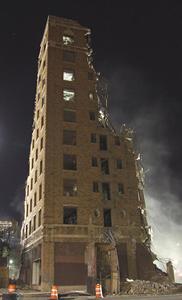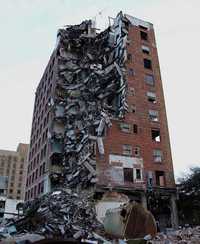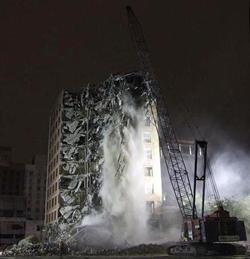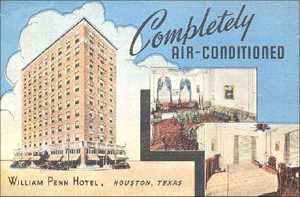William Penn Hotel Houston William Penn Biography Omni Willam Penn Pittsburg PA. (original) (raw)
Rooms with a Past � Razed in Texas
THE WILLIAM PENN HOTEL
Joseph Finger - Architect
1925 - 2006
1423 Texas Avenue
10 Stories
Houston Hotels > Book Your Hotel Here & Save
An article by reporter Lisa Gray in the January 28, Houston Chronicle reported the demolition of the William Penn Hotel. Vacant since its last tenant moved out in 1994, the article was titled "Hotel's demolition catches preservationists by surprise."
 |
|---|
| The last complete corner.Photo courtesy www.arch-ive.org., January 2006 |
 |
|---|
| Demolition in progressPhoto courtesy www.arch-ive.org., January 2006 |
 |
|---|
| A dramatic night view of the demolition. Photo courtesy www.arch-ive.org., January 2006 |
According to the article, the owner of the building decided to demolish the building to make decisions easier for any potential buyer. Downtown Houston, which has had success in rehabilitating and remodeling many older buildings for lofts and apartments now has another vacant lot. The buildings owners stated that the low ceilings and small rooms weighed heavily against its conversion. One photo that accompanied the text, showed 90% of the structure already gone.
 |
|---|
| Final remains in front of the Houstonskyline.Photo courtesy www.arch-ive.org., January 2006 |
 |
|---|
| _William Penn Hotel in 1942_Postcard courtesy rootsweb.com/ %7Etxpstcrd/ |
In 2003 the buildings owners had received a "Good Brick Award" from the Greater Houston Preservation Alliance.
The most recent awards (held Friday, January 27, 2006) gave 15 awards - three of them going to renovated buildings designed originally by Joseph Finger.
Houston Hotels > Book Your Hotel Here & Save
A Brief Biography of William Penn, the Man
by John Troesser
Born in England in 1644, Penn converted to Quakerism while attending Oxford University. His enthusiasm for his new faith was considered "aggressive" and he was expelled for misconduct. In 1668 he was thrown into the Tower of London for publishing an attack on the Church of England. When his father (Admiral William Penn) died, Penn inherited an annual income plus a claim of �16,000 against the government. In 1681, in lieu of this claim, he was granted lands in "the colonies" which now comprise the state of Pennsylvania. Penn had wanted to name his vast holdings Sylvania, but King Charles II added Penn's name as a friendly gesture. Penn turned his grant into an asylum for the persecuted Quakers as well as other groups. His desire was to create a government where the people could enjoy "the highest possible degree of freedom and happiness."
His first visit to the New World was in August of 1682. A few months later he met with local Indian tribes under a large tree - providing engravers and historians with a dramatic image (and cigar makers with a memorable trademark). The city of Philadelphia was planned and named by Penn. He remained in the colony for two years before returning to England to influence James II to release all religious prisoners. Due to Penn's intervention, over 1200 Quakers were released and many of these left England for Pennsylvania. Penn was accused of treason and arrested on charges of conspiracy, but was acquitted on all counts. In 1699, he returned to Pennsylvania to govern for another two years. He returned to England in 170l, to find that his English agent had ruined him through mismanagement. The agent died leaving false claims against Penn and rather than be extorted, he voluntarily entered prison. Although his release was arranged by friends, his health was ruined and he died in 1718.
Editor's Note: The town in Washington County, Texas named William Penn was actually named after a riverboat that had been named after the man. Houston Hotels > Book Your Hotel Here & Save
Houston's William Penn Hotel may now be history; but a more opulent hotel under the same name is still accepting guests in Pittsburgh, Pennsylvania. The address is 520 William Penn Place.